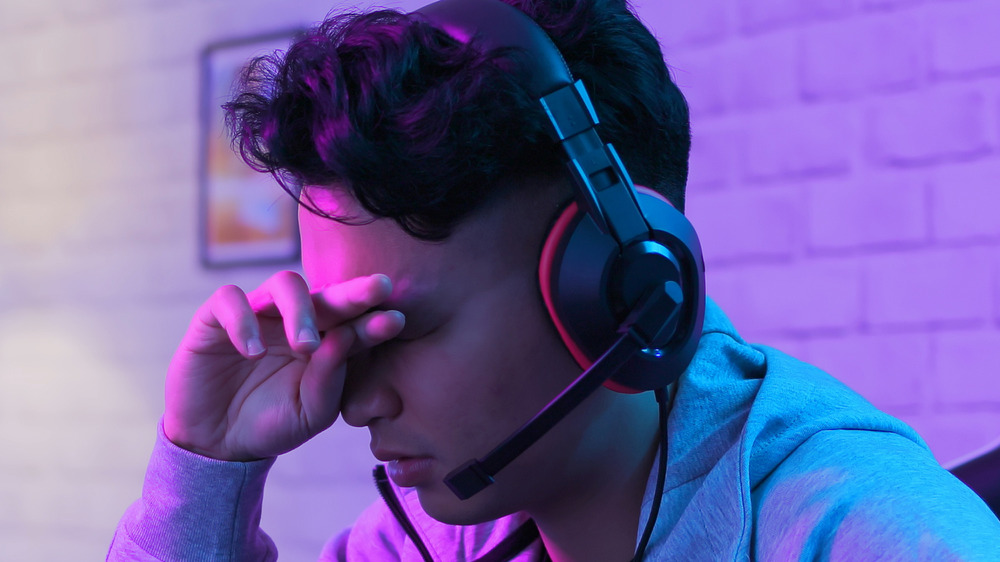What You Really Need To Know About Video Game Addiction
What exactly is video game addiction? Is it a real diagnosis? Or is it just an excuse for parents to tell their children to turn off their screens? Could you be addicted to video games?
While some people accept video game addiction as a fact of life, it's actually a fairly controversial subject. The image that the phrase "video game addiction" paints is a bleak one. In theory, those mired in video game addiction would be unable to concentrate on anything else, unable to move away from their games, and unable to engage with the real world. They would find excitement and rewards only within the game and often neglect their real life: work, school, and relationships.
But how many people are really addicted to video games? Undoubtedly, there have been some serious cases of video game addiction. However, there are also a lot of positive physical benefits to gaming, too. There are also many who believe that "video game addiction" is essentially a non-issue. As with many things, the truth may lie somewhere in between.
Video games aren't classified as addictive
You probably have known someone who seemed to be addicted to video games — but no one knows someone who has been actually diagnosed with a video game addiction. That's because video game addiction is not currently classified as an official diagnosis. According to the American Psychiatric Association, the effects of "internet gaming disorder" are still under study. But like many other myths about gaming, video game addiction itself isn't really a defined thing, in the sense that it isn't a recognized disorder. There's no medical classification for "video game addiction." It is only one type of addictive behavior.
There are things that are inherently addictive, such as various substances. Gambling addiction is often classed as an independent disorder because there is something inherent to the process of gambling that often leads to addiction. Meanwhile, alcohol addiction is classed as a specific disorder.
People can display addictive behavior about anything. People can become addicted to the strangest things, like eating glass. With millions upon millions of gamers the world over, it would seem to follow` that some people can become addicted to video games — just as they can become addicted to anything else.
Video game addiction is pretty rare, regardless
According to a six-year study by Brigham Young University, the vast majority of gamers — 90 percent — play games in a healthy way. However, that still means that 10 percent of gamers may be playing video games in a way that could eventually create negative long-term consequences.
There is an argument that video game addiction is real, in the same sense that gambling is real. The theory is that video games hijack the "reward" processing of your brain. According to Science Direct, some players feel that they need to earn all the rewards available in a game. Concordia University notes that video games can often fulfill a natural need for social interaction, which can further encourage them to continue to play the game — especially for those who cannot achieve social interaction in "real life."
Games that require grinding and have no natural stopping point, like World of Warcraft, appear to give rise to more "messed up" incidents involving apparent addiction. And that includes casual games, too. In 2014, The Guardian wrote about the psychological devastation wrought by mobile games like Candy Crush and Candy Crush Saga.
Playing too many video games has still led to tragedy
It's still true that a preoccupation with gaming has led to some grim situations. In 2010, a South Korean couple neglected their three-month-old daughter while playing video games, leading to the child's death. In 2020, 12-year-old Egyptian boy died of a heart attack while playing PlayerUnknown's Battlegrounds continuously without a break.
According to American Addiction Centers, signs of addiction can include failure to fulfill real-life obligations, neglecting other hobbies, not spending time with friends, declines in personal hygiene, an inability to set limits on gaming, and negative behavior when forced to stop gaming.
Despite not being classified as an official diagnosis, "video game addiction" is treated in a variety of ways, much like other types of addiction. Going "cold turkey" is one of them — as is simply moderating the amount of games played. There are apps today that can monitor (and restrict) screen time, especially in children and teens — and at minimum, it can be worth it to reconsider how much time a person is playing.




